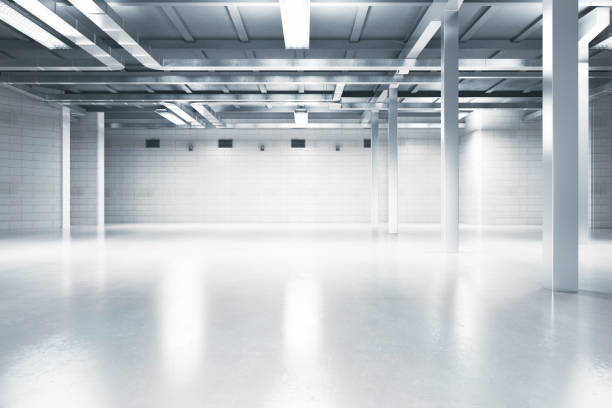
How to Choose the Right Concrete Flooring for Your Industrial Property in Sudbury
How to Choose the Right Concrete Flooring for Your Sudbury Industrial Property
Choosing the right concrete flooring for your industrial property in Sudbury is a critical decision that impacts durability, safety, maintenance, and overall operational efficiency. Industrial floors endure heavy traffic, machinery, chemical spills, and constant wear, so selecting a flooring solution tailored to your specific needs is essential.
This guide will help Sudbury business owners and facility managers understand the key factors in choosing the best concrete flooring for their industrial spaces, ensuring a cost-effective and long-lasting investment.
Why Concrete Flooring Is a Popular Choice for Sudbury Industrial Properties
Concrete flooring is widely used in industrial environments because of its robustness and versatility. It can withstand heavy loads, resist impacts, and endure abrasive conditions, making it ideal for warehouses, factories, workshops, and commercial kitchens in Sudbury.
Moreover, concrete floors can be customised with various finishes and coatings to improve safety, aesthetics, and maintenance. But with so many options available, it’s important to understand which type fits your industry’s demands.
1. Assess Your Industrial Flooring Needs
Before choosing a flooring type, evaluate your property’s specific requirements:
-
Traffic Load: Consider the weight and frequency of vehicles, forklifts, and foot traffic on your floors.
-
Chemical Exposure: Identify any chemicals or oils that may come into contact with the floor and require resistance.
-
Safety Needs: Think about slip resistance and visibility to ensure a safe work environment.
-
Maintenance Capacity: Determine how much time and budget you can allocate for floor upkeep.
-
Aesthetic Requirements: Decide if you want the floor to have a polished look or if functionality takes priority.
Understanding these factors will help narrow down your options and guide your decision.
2. Types of Concrete Flooring for Industrial Properties in Sudbury
Polished Concrete Floors
Polished concrete is created by grinding and polishing the concrete slab to a high gloss finish. It’s highly durable, low-maintenance, and resistant to stains and wear. Polished concrete is suitable for facilities wanting a modern, clean look combined with strength.
Best for: Showrooms, retail warehouses, light industrial spaces, and commercial offices.
Epoxy Coated Concrete Floors
Epoxy coatings involve applying a resin-based layer over the concrete. This creates a seamless, glossy, and chemical-resistant surface that protects against spills, abrasions, and impact.
Best for: Factories, manufacturing plants, automotive workshops, and areas exposed to chemicals or oils.
Resin Flooring
Resin flooring is similar to epoxy but can offer additional flexibility and resistance to heat and chemicals. It’s also available in a range of colours and finishes, allowing customisation for branding or zoning.
Best for: Food processing plants, laboratories, and environments with strict hygiene standards.
Concrete Sealing
Sealing involves applying a protective layer that penetrates the concrete surface to prevent moisture and stains. Sealers maintain the floor’s natural look but enhance its resistance to damage.
Best for: Warehouses and storage facilities with moderate traffic.
3. Consider Safety Features
Industrial floors need to prioritise safety. Slip-resistant coatings and anti-slip aggregates can be added to polished or epoxy floors to reduce accident risks, especially in areas prone to spills or moisture.
Reflective surfaces also improve lighting, enhancing visibility and reducing accidents. Discuss safety requirements with your flooring specialist to select the right solution.
4. Evaluate Maintenance Requirements
Maintenance varies by flooring type. Polished concrete and sealed floors generally require less upkeep, with regular sweeping and occasional mopping. Epoxy and resin floors may require more attention to maintain their glossy finish but offer excellent protection against stains.
Understanding your facility’s capacity for ongoing maintenance will help ensure the chosen flooring remains functional and attractive over time.
5. Budget and Installation Time
Concrete flooring solutions come with different costs and installation timelines. Polished concrete is typically more cost-effective due to minimal materials needed but requires skilled labour for polishing.
Epoxy and resin coatings may have higher upfront costs due to materials and multiple application layers but can offer superior protection in harsh environments.
Installation speed is also crucial for industrial operations. Quick-curing options can minimise downtime, so discuss timelines with your contractor to align with your business schedule.
6. Choose a Trusted Flooring Specialist in Sudbury
Selecting an experienced local contractor is vital for a successful industrial concrete flooring project. The Concrete Flooring Company specialises in tailored flooring solutions for Sudbury’s industrial properties.
Our team assesses your needs, recommends the best materials, and ensures professional installation with minimal disruption to your operations.
Conclusion: Make an Informed Flooring Choice for Your Sudbury Industrial Property
Choosing the right concrete flooring for your industrial property in Sudbury involves evaluating your specific needs, understanding available flooring types, prioritising safety and maintenance, and working within your budget and timeline.
By carefully considering these factors and partnering with a trusted expert, you can invest in a durable, safe, and attractive flooring solution that supports your business for years to come.